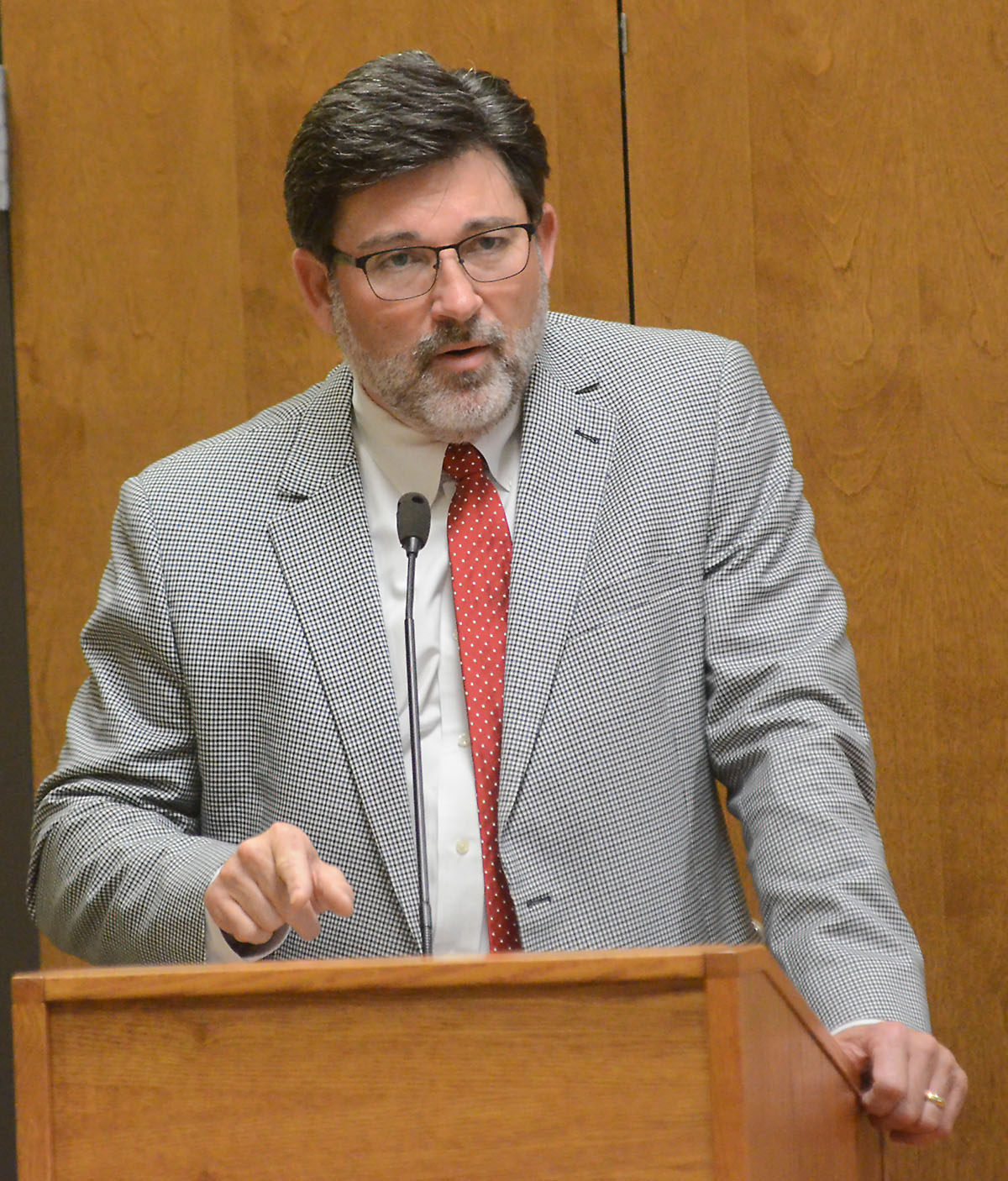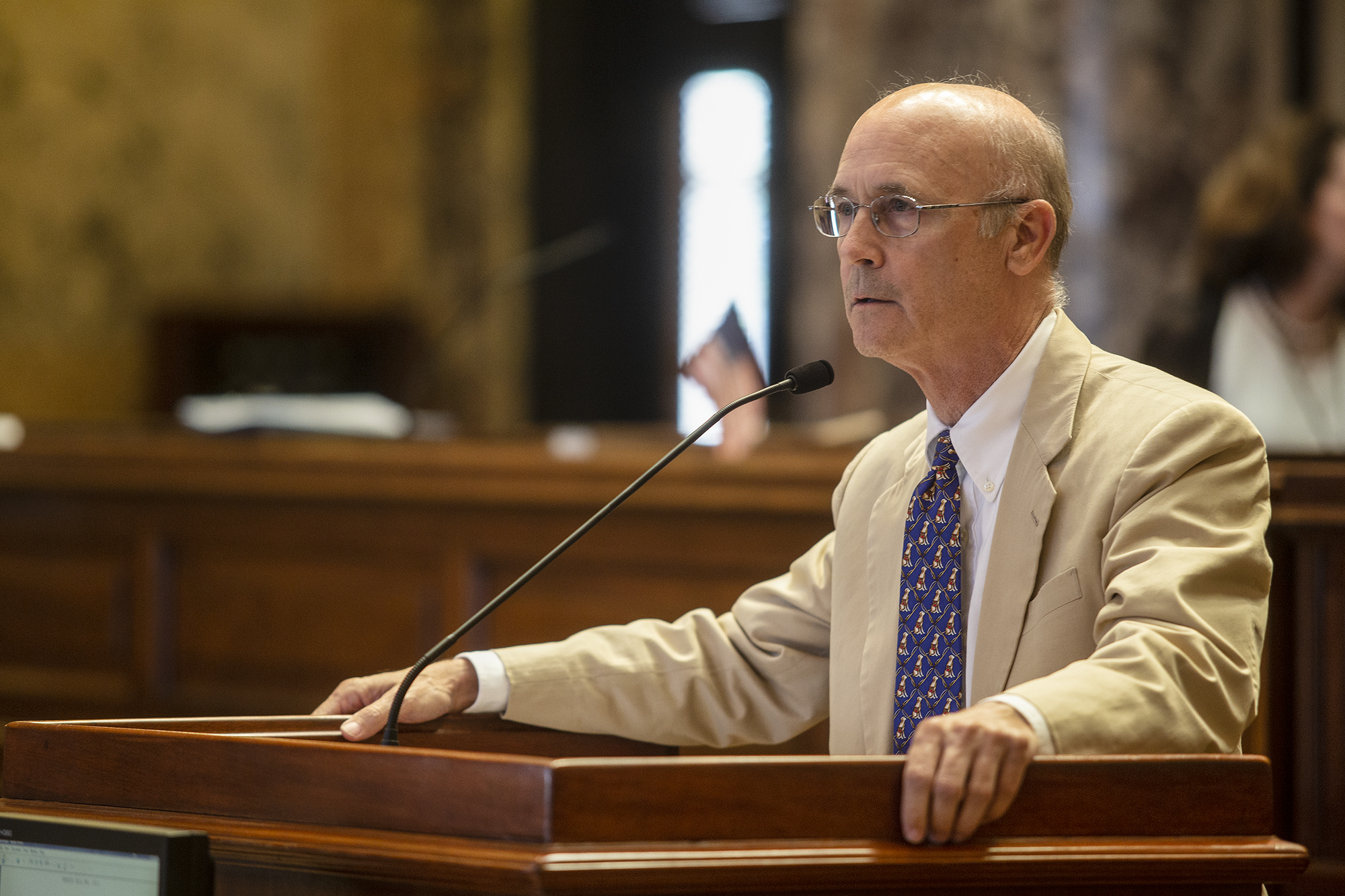Mississippi Today
Millions were supposed to go to Mississippi’s hospitals. Getting that money will be difficult for most, and impossible for others

What should have been a lifeline for Mississippi's struggling hospitals is proving to be out of reach for the facilities that need it the most.
State lawmakers approved sending millions of dollars to save Mississippi's struggling hospitals during the session, but now many hospital leaders are running into difficulties trying to access that money.
A third of Mississippi's rural hospitals are at risk of closure — many of them were counting on the state grants to survive the year.
Legislators in February established the grant program, part of Lt. Gov. Delbert Hosemann's plan to “save rural hospitals,” in lieu of expanding Medicaid. A month later and just days before the end of the legislative session, they decided on the amount: $103 million to be disseminated among the state's struggling health care providers.
It was millions less than the Mississippi Hospital Association had advocated for — despite a $4 billion surplus in the state budget — but health care leaders said they would take what they could get.
Hospitals were allocated varying amounts through a formula that accounted for bed counts, hospital designation, emergency rooms and other factors.
But there was a hitch — the money wouldn't come from the state general fund. Instead, it would come from American Rescue Plan Act funds, federal money meant to ease the financial hits taken by the pandemic.

MHA director Tim Moore, whose organization helped craft the program, said it wasn't clear then how much the source of the money would affect hospitals' ability to access it.
“I think the Legislature felt that it would not be a problem … to get the money out,” he said. “We were looking at them actually cutting grant checks to the hospitals. When ARPA money was applied, that changed the whole thing.”
ARPA funds can only be used to cover COVID-related expenses, and many hospitals have already claimed those federal pandemic reimbursement dollars. Expenses claimed through ARPA cannot have been claimed under any other federal and state reimbursement programs, rendering the grant money useless to many Mississippi hospitals.
According to Paul Black, CEO of Winston Medical Center in Louisville, that makes the grant bill more of a reimbursement bill.
“I don't know who came up with the bright-eyed idea to use ARPA money, if they did, they definitely did not understand what that meant to this program,” he said.
“It's just extremely frustrating that one of the pieces of the legislation … is one thing and the appropriations is something completely different. I don't understand how they can do that, I really don't.”
Both Hosemann and Gov. Tate Reeves, who sent out a release emphasizing his role in the program's passage, declined to comment about the grant situation.
House Public Health Chair Sam Mims, author of House Bill 271 which funded the program, did not respond to a request for comment.
Senate Medicaid Chairman Kevin Blackwell, author of Senate Bill 2372 which established the program, deferred questions about hospitals' issues with the grant program to state Health Officer Dr. Daniel Edney.
The state health department is tasked with distributing the funds, and because it's now tied to federal ARPA funds, has to work with the state department of finance and administration to do so, Edney said.
During the bill process, Edney said the health department pointed out the pitfalls of using the ARPA money.
“Federal money … doesn't take up state resources from other places,” he said. “The downside is it has to follow federal guidelines versus state general funds.”
One of those downsides has already become clear: The allocation based on hospitals' number of licensed beds has been struck, on account of federal guidelines. That means hospitals, if they get money at all, will definitely be getting less than expected.

Senate Public Health Chair Hob Bryan said he's received questions about the grant program from hospital officials and others, and that he still doesn't have all the answers.
“I've asked questions, and I'm still confused,” Bryan said. “I talk with A, and A says one thing, then I talk with B, and B says something else.”
“I think there's a lot of confusion over whether a hospital would have to have already spent money on COVID expenses and can be reimbursed, or whether they can spend in the future. One of the things I've been told is that if you are improving things at your hospital to deal with COVID, or to prepare for the next COVID, then you will be eligible under the regulations.
“Hospitals' reactions appear to be, ‘That's all well and good, but I'm going broke and this says I can spend more money and get reimbursed, but that doesn't help me right now,'” Bryan continued.
Bryan said he believes questions and confusion about the program are in part because of the hasty, secretive process Mississippi legislative leaders have used to set budgets in recent years.
“We do everything in secret, and then put it all together at the last minute,” Bryan said. “Transparency, like say, in conference committees and the rest of the process might help, in that issues like this could be identified and addressed before it's passed. Discussing these things more in the open could provide better results … Of course, we had the House refusing to negotiate on this or anything else because they were holding out for tax cuts, then they tried to do everything in the last 36 ½ minutes.”
Black agreed that hammering out funding details at the last-minute likely contributed to this oversight — an oversight that'll have grave consequences for state's hospitals.
“We got all these legislators that are patting themselves on the back for doing something for the hospitals,” Black said. “When it comes out, they didn't do anything. At least for us to get what was promised in the Senate bill is not what is taking place now.”
Some of the state's larger hospitals might be able to get their hands on some of the money. But it's less likely that the state's smaller, rural hospitals, who are in much more dire financial straits, will be able to.
“The whole intent of this was to help small rural hospitals,” Moore said. “That's going to be much more of a challenge.”
Winston Medical Center was set to receive a little less than a million through the grant program. Because of the funding complications, the hospital actually won't get anything at all.
“Unless the Department of Health comes up and finds out some way to get around some of the issues … as things sit right now, there's no avenue for us to claim any money,” Black said.
The money would've been enough to cover about a month's worth of payroll, Black said, but in the larger scheme of things, it would've helped Winston stay open until the end of the year and staunch the “slow bleed.”
Winston, though, is in a far more stable financial state than many other rural hospitals.
Before the grant money and a big credit line approval, Greenwood Leflore Hospital was weeks from shutting down. It's not clear how the new developments will affect its financial viability.

Gary Marchand, the hospital's leader, said it was too early in the process to answer Mississippi Today's questions, but said he believes the complications caused by the ARPA funding will just slow down when the hospital will receive its allocation.
“We understand MSDH is moving quickly,” Marchand said.
Hospitals can apply for the money during a one-month window that starts June 1. Edney said once a hospital's application is approved, he's hoping to get the money over immediately.
However, Black is more cynical about the reality of the situation.
“That's what they said when they passed the bill back in April, and now it's the end of May going into June,” Black said. “If anybody gets it by September, it'll be a miracle.”
Unless a special session is called to address the funding issue, Moore and Black are looking toward the next legislative session for help. They're hoping that most hospitals survive until then and that state leaders come around to seeing the economic advantages to expanding Medicaid in Mississippi, which would bring millions of dollars to the state's hospitals.
“The analogy I keep thinking about is Charlie Brown, Lucy and the football,” Black said. “Lucy holds the ball for Charlie Brown to kick, and at the last minute, she pulls it back. He falls on his rear end.
“That's what this has been like.”
Reporter Geoff Pender contributed to this story.
This article first appeared on Mississippi Today and is republished here under a Creative Commons license.
Did you miss our previous article…
https://www.biloxinewsevents.com/?p=245957
Mississippi Today
On this day in 1959
April 18, 1959

About 26,000 students took part in the Youth March for Integrated Schools in Washington, D.C. They heard speeches by Martin Luther King Jr., A. Phillip Randolph and NAACP leader Roy Wilkins.
In advance of the march, false accusations were made that Communists had infiltrated the group. In response, the civil rights leaders put out a statement: “The sponsors of the March have not invited Communists or communist organizations. Nor have they invited members of the Ku Klux Klan or the White Citizens' Council. We do not want the participation of these groups, nor of individuals or other organizations holding similar views.”
After the march, a delegation of students went to present their demands to President Eisenhower, only to be told by his deputy assistant that “the president is just as anxious as they are to see an America where discrimination does not exist, where equality of opportunity is available to all.”
King praised the students, saying, “In your great movement to organize a march for integrated schools, you have awakened on hundreds of campuses throughout the land a new spirit of social inquiry to the benefit of all Americans.”
This article first appeared on Mississippi Today and is republished here under a Creative Commons license.
Mississippi Today
Bill would limit how long those convicted could seek relief, even if wrongfully convicted

Legislation being debated in a conference committee would restrict how “Goon Squad” victims and others can get relief if they have been wrongfully convicted.
House Bill 1253 would impose a one-year limitation on newly discovered evidence.
The bill passed the House. The Senate passed an amended version. The House invited conference. Conferees are Kevin Horan, Lance Varner and Celeste in the House and Joey Fillingane, Daniel Sparks and Derrick Simmons in the Senate.
“It would impact the constitutional right to access the courts in Mississippi by any inmate — innocent persons and Goon Squad victims included,” Krissy Nobile, director of the Mississippi Office of Capital Post-Conviction Counsel, said of HB 1253. “It is terrible legislation that is detached from how the legal system actually works.”
Mississippi Attorney General Lynn Fitch's office, which has been pushing for the passage, defends the bill.
“HB 1253 streamlines the pathway to justice and closure for victims of crime and families of homicide victims, restoring some balance to the post-conviction appellate process,” said Fitch's chief of staff, Michelle Williams. “It would be a wonderful way to mark Crime Victims' Rights Week next week with passage of this important legislation.”
The bill is being touted as a way to streamline appeals of those who have been convicted, but defense lawyers worry that this change may erode constitutional rights.
In January 2023, five deputies for the Rankin County Sheriff's Department and a Richland police officer, who were part of a “Goon Squad” operation, broke into a house without a warrant, tortured two Black men, Michael Corey Jenkins and Eddie Terrell Parker, threatened to use a sex toy on them and shoved a gun in Jenkins' mouth and shot him. To conceal their crimes, they destroyed surveillance footage, planted false evidence and lied to investigators.
Last month, a federal judge sentenced those officers to between 18 and 40 years in prison. They received similar sentences in state court.
But an investigation by the Mississippi Center for Investigative Reporting at Mississippi Today and The New York Times uncovered allegations that torture, coerced statements and false incident reports involving, not only these six officers, but more than a dozen others with cases that may stretch back two decades. Some of those interviewed alleged that deputies also planted evidence and filed false charges against them.
Rankin County District Attorney Bubba Bramlett has said his office is examining pending cases involving these six officers. In any cases where their testimony was essential or the integrity of the investigation may have been compromised, those cases are being dismissed, he said.
But Bramlett has declined to explain how far back his office will look, and questions remain about how many of those arrested by the Rankin County Sheriff's Department on drug charges have been either wrongfully charged or convicted.
State Public Defender Andre de Gruy sees problems with this legislation for cases involving claims of wrongful convictions.
“For this [Goon Squad] scandal, it would be one year from passage,” said State Public Defender Andre de Gruy. “Future scandals might be harder to predict, and a lawyer miscalculating and not filing on time would not be an excuse.”
Nobile said a one-year window is hardly enough time to develop new evidence and file a petition. “The discovery of new evidence and the development in forensic sciences sometimes takes years to develop,” she said.
For instance, the last five people exonerated from Mississippi's death row were wrongfully imprisoned for 22 years on average, she said.
If this new bill had been the law, she said these five people might have been executed, only for them to be exonerated after their deaths.
Nobile said the Mississippi Supreme Court has recently decided that it has no power to recognize constitutional rights after someone is convicted, even if those rights are violated.
“My concern about the core constitutional rights is that they deserve to be protected because they are, by their very nature, in the state and-or federal constitution,” she said. “When a person's criminal case is infected with constitutional defects, especially when a verdict is made unsafe as a result, finality is not a legitimate interest. In that event, finality is a fiction, and all that exists is an interest in expediency.”
This article first appeared on Mississippi Today and is republished here under a Creative Commons license.
Mississippi Today
‘If you can’t vote, you’re nobody:’ Lawmakers hear from rehabilitated felons who still can’t exercise right
Kenneth Almons has not received so much as a speeding ticket since he was released from the Mississippi State Penitentiary nearly three decades ago, but a punitive state policy still forces him to carry a sense of shame each day.
At 51, he's run his own business, currently works for the city of Jackson, has raised three children and has, by most standards, been a picture-perfect example for what state officials would consider being rehabilitated and re-entering society.
But because he was convicted of armed robbery and aggravated assault at 17 years old, he still cannot cast a vote in a Mississippi election.
“We all make mistakes,” Almons told a group of state lawmakers on Wednesday. “Some are just greater than others.”
Almons is one of thousands of Mississippians who have lost their right to vote for life because of a Jim Crow-era provision in the state constitution that imposes a permanent voting ban on people who have been convicted of certain felony offenses.
The white supremacist drafters of Mississippi's 1890 Constitution first established a list of disenfranchising crimes they believed at the time were more likely to be committed by Black people.
Under the Mississippi Constitution, people convicted of any of 10 felonies — including perjury, arson and bigamy — lose their voting rights for life. Opinions from the Mississippi Attorney General's Office since expanded the list of disenfranchising felonies to 23, including armed robbery.
About 55,000 names are on the Secretary of State's voter disenfranchisement list as of March 19. The list, provided to Mississippi Today through a public records request, goes back to 1992 for felony convictions in state court.
Lawmakers who attended the hearing asked Almons, who served five years in state prison, what it would mean if the state restored his voting rights.
“It would mean I'm no longer a nobody,” Almons responded. “And if you can't vote, you're nobody. And in the public's eye, I'm a nobody.”
The GOP-majority House overwhelmingly passed legislation earlier this session along bipartisan lines that would have automatically restored voting rights to people who served their sentences for nonviolent felonies. But Senate Constitution Chairman Angela Burks Hill, a Republican from Picayune, killed the measure by not bringing it up for a vote in committee.
The House measure likely would not have restored Almons' suffrage because armed robbery is considered a violent crime, but it would have created a pathway for thousands of other Mississippians to regain their voting rights.
Democratic Rep. Kabir Karriem of Columbus criticized Hill's decision to kill the House measure but said her inaction should galvanize lawmakers and other advocates to double down on their efforts to advance suffrage legislation.
“Restoring voting rights is not merely a political matter,” Karriem said. “It is a fundamental human rights issue. The right to vote is the cornerstone of our democracy.”
Hill did not respond to a request for comment, but she previously told Mississippi Today she decided not to take the felony suffrage measure up because the “Constitution speaks for itself.”
Though the House's major suffrage bill is dead, lawmakers can still introduce individual bills to restore voting rights on behalf of citizens, but the process is burdensome. It requires two-thirds of lawmakers in both legislative chambers to vote in favor of restoring suffrage in individual cases.
“We have a process in the Legislature that helps to restore individuals' voting rights, but it is a terrible process,” Democratic Rep. Zakiya Summers of Jackson said. “And it's a cumbersome process. And there really is no easy way to navigate it.”
The Legislature last year did not pass any suffrage restoration bills. A person can also seek a gubernatorial pardon, though no executive pardon has been handed down since Gov. Haley Barbour's final days in office in 2011.
Lawmakers in both chambers of the Capitol have filed around 50 individual suffrage bills so far this session. The speaker of the House and the lieutenant governor have referred those bills to the respective Judiciary B committees for consideration.
Neither committee is currently scheduled to conduct a meeting on the suffrage bills, but lawmakers can consider those measures until the last remaining days of the 2024 session.
This article first appeared on Mississippi Today and is republished here under a Creative Commons license.
-
Mississippi News4 days ago
Mississippi will soon be bombarded with cicadas
-
SuperTalk FM3 days ago
4 tornadoes touched down in Mississippi during latest round of severe storms
-
SuperTalk FM4 days ago
2 Jones County correctional officers arrested in smuggling bust
-
Mississippi News6 days ago
Columbus schools may see needed upgrades with bond issue
-
SuperTalk FM1 day ago
Chance of parole denied for man who killed 3 Choctaw Indian tribal members
-
Local News4 days ago
Almost 3,500 Mississippi Veterans have enrolled in VA health care in past 365 days, 28% increase over last year
-
Kaiser Health News1 day ago
To Stop Fentanyl Deaths in Philadelphia, Knocking on Doors and Handing Out Overdose Kits
-
SuperTalk FM7 days ago
Explosion at elementary school in Mississippi Delta hospitalizes two employees









































